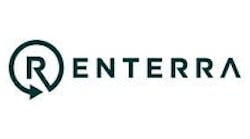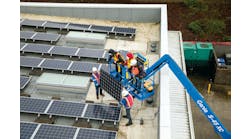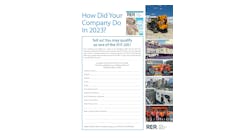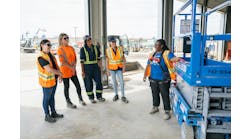International Powered Access Federation officials commented on the new Corporate Manslaughter and Corporate Homicide Act 2007 at the IPAF Summit on April 15. The Act, which went into force on April 6, and applies across the United Kingdom, will support well-managed access companies by punishing those that take unjustifiable risks with people’s safety, according to barrister Denis Barry, who spoke at the summit.
Under the law, an organization is guilty of a statutory offence if the way in which it manages or organizes its activities causes a death and amounts to a gross breach of a relevant duty of care to the deceased. A substantial part of the breach must have been in the way activities were managed by senior management.
Barry explained to the audience of access equipment manufacturers, rental companies and end users, that duty of care is an obligation that organizations have to take reasonable steps to protect people’s safety. These duties exist, for example, in respect of work systems and equipment used by employees, the condition of worksites and other premises occupied by an organization, and products or services supplied to customers.
Organizations convicted of the offence can receive 1) a fine, with no maximum limit, 2) a publicity order, which requires an organization to publicize the fact of its conviction, and 3) a remedial order, which requires the organization to address the cause of the fatal injury. He urged access companies to review management and operator training procedures, and to ensure that safety systems are in place, as the key question that the Act poses is whether management’s failure to organize activities properly caused the victim’s death.
The management of thorough examinations of access equipment is a key aspect of this safety culture, a theme addressed by Gil Male, IPAF technical officer and formerly HM principal specialist inspector with the Health and Safety Executive’s Technology Unit.
Male examined inspection and thorough examination practices in Europe, as outlined in the Use of Work Equipment Directive 95/63/EC, and the United States, as defined in the ANSI standards.
Users (employers or self-employed) are responsible for ensuring that access equipment is not used unless they have a current examination report and for arranging for examinations to be carried out by competent persons. Competent persons are responsible for carrying out thorough examinations and for taking appropriate further action where there is serious imminent risk of injury.
Across Europe and the U.S., differences exist in the frequency of thorough examinations. For example, 12 months in Germany, Italy and the Netherlands vs. 6 months in the U.K. and France vs. 3 months plus an annual inspection in the U.S. Other differences lie in the nature of the examination record (certificate, report, entry in machine safety file or sticker), the required length of time for record keeping, and the type of competent person (government inspectors, second- or third-party inspectors).
Male indicated that IPAF is working with the European Rental Association on a statement on thorough examinations that would outline best practice on this subject.
Presentations from the IPAF Summit on the theme of thorough examinations are available at www.ipaf.org
The next IPAF Summit will be held on April 2, 2009 in Dublin, Ireland. The Summit is free of charge and open to all upon registration.
IPAF is a not-for-profit members’ organization that promotes the safe and effective use of powered access equipment worldwide. Members include rental companies, manufacturers, distributors and equipment owners.





